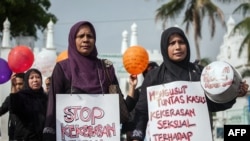In 2019, Indonesians saw a surging number of cases of violence involving children.
In April, a 14-year-old girl was bullied and physically assaulted by three high school students in Pontianak, West Kalimantan. Her case created an uproar on social media.
On July 13, a 16-year-old student at a military school in Palembang, South Sumatra, was a victim of hazing during orientation week. He died in a hospital days later.
At the end of July, the police in Aceh, Indonesia’s most conservative province, arrested two men who worked at an Islamic school. They allegedly sexually abused 15 students between the ages of 13 and 14, according to two students who came forward and further investigation by authorities.
In 2019, nearly 1,200 reports so far
Rita Pranawati, the deputy chairwoman of the National Commission for Child Protection (KPAI), said those are only some of the cases of violence against children that were exposed and reported by the media. From January to May 2019, Pranawati said the commission received 1,192 reports of violence, including physical, psychological or sexual abuse.
“There are still many unreported cases, for example, the figure of child marriage is not included. That’s also a form of abuse against children,” she told VOA in her Jakarta office last week. “Or other things, such as parents physically abusing their children, only when there’s a death or the child is severely injured then it will be reported.”
Sexual violence cases rising
Indonesia’s Witness and Victim Protection Agency (LPSK) receives a growing number of requests to protect victims of child sexual abuse. As of June, the agency was reviewing 78 cases. Edwin Partogi Pasaribu, the deputy chairman of LPSK, said the agency deals with at least four cases every week.
“From our point of view, based on the requests that we received, sexual violence is something that becomes a real concern for us. The figure from 2016 to 2019 continued to increase,” he said at a press conference in Jakarta.
According to the data from LPSK, in 2017 there were 70 victims of child sexual abuse, and in 2018 the number rose to 149.
Achmadi, also a deputy chairman of the LPSK, said 80% of those cases were committed by the victim’s close relatives and 20% by strangers.
“Perpetrators of sexual violence are usually people known by the victims,” he added.
Nevertheless, there is still a harmful social stigma surrounding victims of sexual violence, said Pranawati of the child protection commission. She said victim-blaming is still common, especially when the victims are older teenagers.
“In cases of sexual abuse, sometimes the family or school prefer not to come forward because they are ashamed,” she said.
Greater awareness
Pranawati says Indonesia has regulations, written in the law on child protection, in cases of violence against minors.
“The law is quite comprehensive, and we also have social norms. But of course there are challenges,” she said.
One of the challenges is to persuade community members to report abuse against children and to create a safe environment for victims. Pranawati said law enforcement agencies need more staff trained to handle cases involving children.
KPAI has been encouraging schools to adopt a “child-friendly” school scheme that includes making staff and management more aware of the need for child protection and better trained to cope with problems. The commission also encourages school leaders to craft a culture that offers a more equal relationship between students and teachers.
“This is important, to build a climate that is child friendly in schools. The government is currently discussing the presidential decree on this, but it hasn’t been finalized,” Pranawati said. She added children should be taught the concept of consent and how to be assertive.
Pribudiarta Nur Sitepu, the secretary for the minister of Women Empowerment and Child Protection, said ending violence against children is one of their top priorities.
“This is our concern, because it’s human rights,” he said at a recent press conference.




